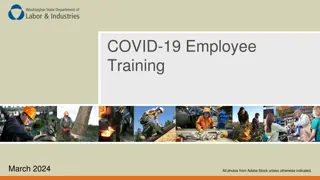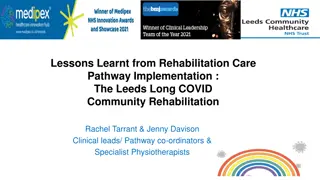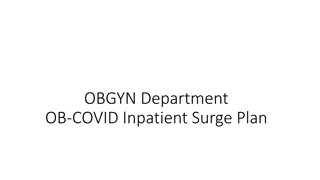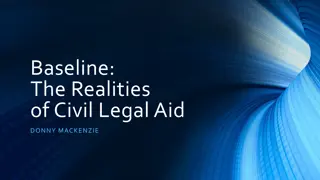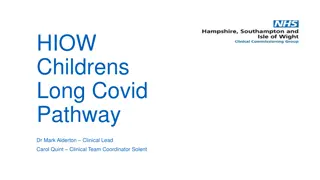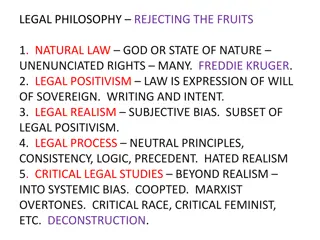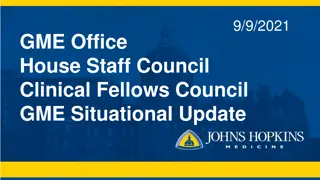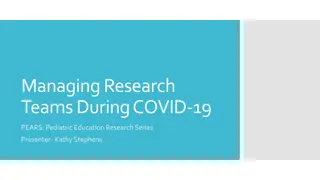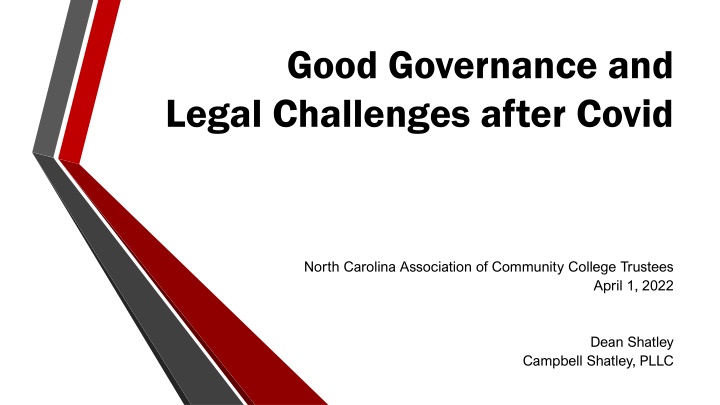
Legal Challenges & Governance Post-COVID: Insights for Trustees
Explore key insights on legal challenges and good governance strategies post-COVID, including lessons learned from the K-12 world and navigating divisive political climates. Understand the importance of public meetings and the nuances of remote/electronic meetings in the current landscape.
Download Presentation

Please find below an Image/Link to download the presentation.
The content on the website is provided AS IS for your information and personal use only. It may not be sold, licensed, or shared on other websites without obtaining consent from the author. If you encounter any issues during the download, it is possible that the publisher has removed the file from their server.
You are allowed to download the files provided on this website for personal or commercial use, subject to the condition that they are used lawfully. All files are the property of their respective owners.
The content on the website is provided AS IS for your information and personal use only. It may not be sold, licensed, or shared on other websites without obtaining consent from the author.
E N D
Presentation Transcript
Good Governance and Legal Challenges after Covid North Carolina Association of Community College Trustees April 1, 2022 Dean Shatley Campbell Shatley, PLLC
Topics Preventing the Unforced Error Lessons Learned from the K-12 World Social Media Navigating a divisive political climate Good Governance, regardless of the pandemic . . .
Preventing the Unforced Error Lessons Learned in the K Lessons Learned in the K- -12 World 12 World Social Media Social Media Navigating a Divisive Political Climate Navigating a Divisive Political Climate
Lessons from the K-12 World Board meetings Public Record Requests Faculty on the High School Campus
What is a public meeting? A meeting of a majority of Board members (or a committee formed by the Board regardless of the number of Board members) involving Board action, deliberation and information gathering All committees formed by the Board should be considered public bodies, even if the committee has non-Trustee members "Meeting" does NOT include non-college events / social / ceremonial gatherings or meetings of less than a majority of Board members
To be or Not to be, a Public Meeting? HOWEVER, less than a majority cannot meet if the meeting is intended intended to circumvent the law circumvent the law: to avoid public debate to obtain agreement on an outcome for the President to inform / seek input for Board members to ask questions / get info
Remote/Electronic Meetings The New "Normal"? What is a "remote meeting" definition: An official meeting between one and all members participating by telephone, conference video or other electronic means. Emergency COVID law When applicable What is required for a remote meeting? When can you have a remote meeting? Roll Call Votes Lost connection during meeting Text/email messages exchanged during the meeting are public records!
Not legally required unless the meeting is remote May not be expected in your community Live Streaming Public Meetings Pros and Cons Transparency, accessibility and accountability versus administrative/technological burden, recording of meeting (possible recording of disruption at meeting) Can we cut live stream during a recess? During a disruption? ADA/Accessibility
Public Record Requests Since last summer, local governments have seen an increase in public record requests: Covid, face coverings and other protocols Emails with Health Dept. Bonds, Insurance, Oaths of Office, Attorney fees E-mails, E-mails, and more E-mails!
Public Records Best Practice Assume that ALL written communications and voicemails will be made available to students/employees, the public and/or the media upon request. If that makes you nervous, DON T PUT IT IN WRITING!
Public Records: Assume everything that "relates" in Public Records: Assume everything that "relates" in any way to the College is a public record. (e.g. notes, any way to the College is a public record. (e.g. notes, voicemails, letters, voicemails, letters, e e- -mails mails, and , and text messages text messages) ) The most common exceptions are: Purely Personal Records Personal records, including e-mail, that do not have anything to do with the College or its business are not a public record (i.e. an e-mail to Mom saying Happy Birthday). Personnel Records Most information on an employee or applicant, gathered by the employer, regarding the employee s performance, evaluation and/or disciplinary action is likely to be a personnel record. This can include records outside of the central office personnel file.
Student Records Education records of a student or prospective student and personally identifiable information under FERPA are not considered public records. Attorney-Client Communication ONLY CERTAIN COMMUNICATIONS FROM THE ATTORNEY ARE EXCLUDED, NOT EMAILS FROM YOU! Legal questions, or requests for legal advice are public records (unless about personnel or another exceptions). Trial Preparation Materials To be excluded, trial preparation materials must be prepared in anticipation of legal proceedings and include mental impressions and opinions of the author.
Volunteer File Any information that relates to a volunteer's performance, selection, non-selection, disciplinary action, or termination. Other Exceptions: Address Confidentiality Program Information Medical Records Criminal Investigations Trade Secrets of Bidders/Vendors/Contractors
College Faculty on the High School Campus A 31-year-old college faculty member teaches a college level course at a local high school. She has a rainbow patch on her shoulder bag and her coffee cup says "BLM." Two parents complain. One day in class a student tells her that "All Lives Matter." The teacher debates the student over the issue and while she doesn t say anything inappropriate, her tone is demeaning. The parent complains. The teacher assigns the book Dear Martin during Black History Month. Several parents complain because the book contains profanity. One parent posts a tirade on social media.
The Social Media The Social Media Dilemma Dilemma What can you control? What can you control? College owned platforms Official College social media channels (to an extent) Make sure your channels have "community standards." What can you not control? What can you not control? Other people Students Most employees Social Media platforms
What You Cant Control University can t prohibit speech because it's found to be offensive, even if large numbers of people find it to be offensive Colleges cannot prohibit speech or restrict expression based on its content Colleges cannot prohibit speech by adopting policies that are overbroad or vague Employee speech that is a matter of public concern
Federal Protection for Social Media Providers Section 230 of the Federal Communications Decency Act of 1996 No provider or user of an interactive computer service shall be treated as the publisher or speaker of any information provided by another information content provider. No cause of action may be brought, and no liability may be imposed under any State or local law that is inconsistent with this section. "interactive computer service" means any information service, system, or access software provider that provides or enables computer access by multiple users to a computer server. This means that social media sites do NOT have to remove This means that social media sites do NOT have to remove defamatory/offensive content even after notification. defamatory/offensive content even after notification.
Advice regarding Offensive/Defamatory Posts You can t control what everyone posts, including your employees. If you truly believe the College or one of its employees have been defamed and financially harmed and financially harmed, seek an attorney's opinion. Stop and think: "Do I really want to prove me?" prove that this person damaged Although the College may hire an attorney to initially advise it and you, the College is under no legal or policy obligation to pay for a lawsuit on behalf of an employee. The general rule is that employees must file their own lawsuits since public money is involved.
Advice regarding Offensive/Defamatory Posts Instead of legal action, focus on what you can control! Questions and actions? Are people reading this stuff? Is it believable? Is the person posting credible? Is this a matter of public concern? Who is damaged, if anyone?
Fight Back!? If a response is needed, make it targeted to the audience you care about about. audience you care Options include: Individual phone calls, emails or letters Cease and desist letter from College Attorney or private attorney Responsive postings on the same social media site Blocking offenders if the College controls the site, i.e., FaceBook
"Official" Social Media Channels? Knight v. Trump, 928 F. 3d 226 (2nd Cir 2019) During the Trump administration, President Trump used his personal twitter account to make posts about official US government business President Trump's Twitter account included a comments section and the President's tweets routinely generated thousands of comments Several Plaintiffs filed a First Amendment lawsuit alleging that they had been blocked from President Trump's twitter for posting comments critical of the administration Example of blocked comment: "To be fair you didn't win the WH: Russia won it for you"
The Second Circuit Court of Appeals held that President Trump's use of his twitter feed for government business amounted to a "digital public forum" Therefore, President Trump's selective blocking of certain negative comments was viewpoint discrimination prohibited by the First Amendment Key Takeaways: Biden v. Knight First Amendment Inst. at Columbia Univ, 141 S.Ct. 1220 (Apr. 2021) (mootness, administration change). Stay Tuned! Traditional First Amendment principles and social media are on a collision course When a College opens a forum for speech it must be content neutral College employees must be careful to separate personal social media accounts from official College accounts
Good Governance The Hourglass Look To Your Policies Finding the Right Information Addressing Complaints
Best Practices for Good Governance at the Community College Level
The Board is a Corporate Entity N. C. Gen. Stat. 115D-14: The Board of Trustees ("Board") is a body corporate. Members of the Board have authority only when acting as the Board in a properly and duly called meeting. State statute gives the Board the following authority: Powers to acquire, hold, and transfer real and personal property Enter into contracts Institute and defend legal actions Other specific powers delegated by the State Board of Community Colleges (N. C. Gen. Stat. 115D-20) Exercise such other rights and privileges as may be necessary for the management and administration of the College
Look To and Follow College Policies Tully v. City of Wilmington Police Officer failed his sergeant examination and was denied promotion. After being shown the questions he "incorrectly" answered, he believed the answers that were considered correct were based on outdated law. He filed a grievance regarding the test, through the appropriate HR channels. Department Policy stated: Candidates may appeal any portion of the selection process. The appeal must be made consistent with the City of Wilmington Personnel Policy on Employee Grievances. If practical, re-application, re-testing, re-scoring and/or re-evaluation of candidates may be required if an error in the process is substantiated.
Tully v. City of Wilmington The City, however, allegedly denied his grievance, and stated that answers to the examination were not "grievable." Officer sued, claiming that his inability to go through the grievance process outlined in the Department's policies violated his constitutional property interest. In other words - by denying him his promotion due to his answers on the examination and then determining that such a reason was not grievable, the City arbitrarily and irrationally deprived him of enjoyment of the "fruits of his own labor."
Tully v. City of Wilmington Article I, Sec. I of the NC Constitution: "All persona are . . . endowed by their Creator with certain inalienable rights," including "the enjoyment of the fruits of their own labor." of their own labor." The State Supreme Court held that Tully, if his allegations are taken as true, stated a claim under the Constitution that safeguards the fruits of one's own labor. In the earlier split-opinion of the Court of Appeals, the majority stated the following: fruits it is inherently arbitrary for a government entity to establish and promulgate policies and procedures and then not only utterly fail to follow them, but further to claim that an employee subject to those policies and procedures is not entitled to challenge that failure
Tully v. City of Wilmington The Court established the following four elements of a viable claim that the employer burdened the right to the enjoyment of the fruits of the employee's labor under the NC Constitution: A clear, established rule or policy existed regarding the employment process that furthered a governmental interest; The employer violated the policy; The Plaintiff was injured as a result of the violation; and Plaintiff must also establish there is no state law remedy available before turning to the Constitution.
Considerations Employees and students are increasingly turning to state constitutional provisions to fight Reasons for termination and the public record; should the employee be allowed the opportunity to a name-clearing hearing Ensure your policies provide due process Follow your policies Retaliation claims
Duty to Maintain Impartiality in the Exercise of Judicial Functions The board has a duty to maintain impartiality as a part of its quasi-judicial function. The Fourteenth Amendment to the U.S. Constitution guarantees the right to "due process" before a liberty or property interest can be taken away. The right to due process includes the right to a fair hearing before an impartial decision impartial decision- -maker. maker. fair hearing before an
Duty to Maintain Impartiality in the Exercise of Judicial Functions When performing their judicial function during a board hearing and resulting deliberations, board members must act impartially and in a fair manner. Members must be able to set aside their prior knowledge and preconceptions concerning the matter at issue and base their considerations solely upon the evidence presented at the hearing.
Duty to Maintain Impartiality in the Exercise of Judicial Functions Mere familiarity with facts concerning a charge against a person or prior involvement in the case does not automatically indicate bias, but a fixed decision, made prior to the hearing, to vote in a particular way is impermissible bias.
Duty to Maintain Impartiality in the Exercise of Judicial Functions If a board determines that a member is not impartial on a matter that is before the board for hearing, the board may disqualify the member from the hearing. Board members may always request to individually recuse themselves from hearing a matter on appeal, too, if they have an impermissible bias or conflict of interest.
Best Practice: "Information" v. Studies or Research Board members are free to request basic information from College employees However, remember: o Only a majority of the Board should direct the President to conduct a study or do research on an issue o Board members should not request access to employee information without alerting the President and the Chair o It is not the job of Board members to "investigate" matters o Best practice is to request information directly from the President
Best Practice: Complaints and Concerns Employees, students, vendors, community leaders etc. will come directly to Board Members with complaints or concerns for three (3) reasons: o First, they may know you personally; o Second, they don t know the correct protocol and need help; or o Third, they want a special favor or advantage Third, they want a special favor or advantage from you personally. from you personally.
Best Practice: Complaints and Concerns Board members should assist folks in identifying the correct administrator to address their concern (i.e. use the "lazy board member" policy = if unsure, direct them to the President or VP) Don t let folks do an "end run": Policy allows for grievances, complaints, and appeals to the Board in certain cases Refer student/personnel issues requiring investigation, research, and/or study to the President for action or recommendation
Best Practice: Complaints and Concerns Bottom-Line Advice Listen to concerns but don t promise specific outcomes or results Never promise to "keep someone s name confidential" you can t! Educate employees and others on the proper procedure and notify the appropriate administration of the concern Always give the Board Chair, Vice Chair and/or President a "heads up" about issues that sound significant Do not ignore anonymous complaints. Refer issues that would be significant "if true".
Questions? Rude Remarks?

